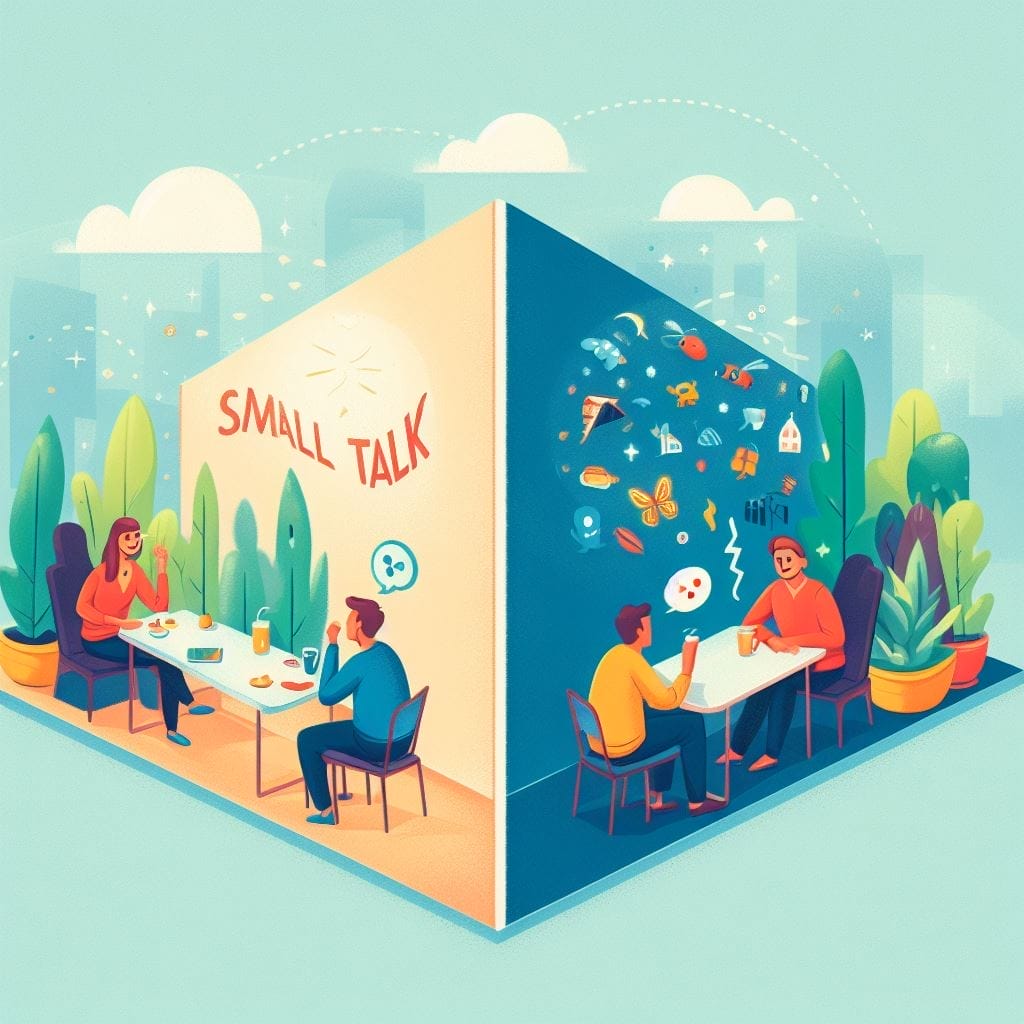Introduction
In a world buzzing with the constant hum of small talk, where casual exchanges often dance on the surface of meaningful connection, it becomes imperative to peel back the layers and explore the intricate negatives that lie beneath. Small talk, which is a harmless social lubricant but with tremendous implications for personal health. So today in this guide you will learn ‘What are the negatives of small talk?
We begin to discover the harm that occurs not only at that interpersonal level but also inwardly undermining the mental comfort zone of the person. Let us traverse the intricacies of shallow conversations while we seek out the complexities hidden in little chats.
Key Takeaways
- Gain Insight: Understand the superficial nature of small talk and its implications on building meaningful connections.
- Save Time: Recognize the potential time-wasting aspects of small talk and redirect your energy toward more important tasks and conversations.
- Foster Genuine Conversations: Learn how to avoid the shallow exchange of information by steering discussions towards more substantial topics, promoting intellectual and emotional engagement.
- Embrace Authenticity: Explore the pitfalls of hiding behind a facade in small talk and discover the importance of genuine self-expression.
- Prioritize Mental Well-being: Recognize the social fatigue and anxiety related to constant superficial conversations and take steps to protect your mental health.
- Seize Opportunities for Growth: Understand how small speak may additionally restrict non-public development and discover strategies to foster getting to know and include diverse views.
- Challenge Norms: Uncover the position of small communication in reinforcing social norms and stereotypes, and empower yourself to mission and sell modern ideas.
- Strive for Meaningful Conversations: Reflect on the poor components of small speak and be inspired to are searching for extra significant interactions, balancing casual exchanges with deeper and enriching dialogues.

Table of Limitations of Small Talk: A Comprehensive Overview of its Drawbacks
| Negatives of Small Talk | Description |
|---|---|
| 1. Superficiality | Small talk tends to be shallow and lacks depth, often revolving around generic topics such as weather, making it difficult to establish meaningful connections. |
| 2. Time Consuming | Engaging in small talk can be time-consuming, diverting time and energy away from more substantial conversations or tasks. |
| 3. Lack of Authenticity | Small talk may feel forced, leading to a lack of authenticity. Participants may percentage information without actually expressing their thoughts or feelings. |
| 4. Potential for Miscommunication | Due to its informal nature, small talk may lead to misinterpretation or misunderstanding, as nuances and important details may be overlooked in casual conversations. |
| 5. Inefficiency in Information Exchange | Meaningful information may be lost in the brevity of small talk, making it an inefficient means of exchanging important ideas or opinions. |
| 6. Exclusionary Nature | Individuals who are not adept at or comfortable with small talk may feel excluded or marginalized in social or professional settings that heavily rely on casual conversation. |
| 7. Discomfort for Introverts | Introverted individuals often find small talk draining and may feel uncomfortable in social situations where it is the predominant form of communication. |
| 8. Reinforcement of Social Norms | Small talk tends to adhere to societal norms and conventions, potentially limiting the exploration of diverse perspectives or challenging established ideas. |
| 9. Limited Emotional Connection | Small talk may not facilitate the development of strong emotional connections between individuals, hindering the growth of deeper relationships. |
| 10. Missed Opportunities for Growth | Focusing on small talk may divert attention from more substantial discussions that could lead to personal or professional growth and development. |
| 11. Overemphasis on Politeness | Small talk often places a high value on politeness, potentially suppressing honest and direct communication, which is essential in certain contexts. |
| 12. Potential for Boredom | Prolonged engagement in small talk, especially on repetitive or uninteresting topics, can lead to boredom and disinterest, negatively impacting the overall social experience. |
| 13. Cultural Sensitivity Challenges | Small talk topics may vary across cultures, leading to potential misunderstandings or discomfort when individuals from different cultural backgrounds engage in casual conversation. |
| 14. Limited Problem-Solving Abilities | Small talk is not conducive to addressing complex issues or solving problems, as it lacks the depth and analysis required for tackling more significant challenges. |
| 15. Emotional Drainage for Some Individuals | Constant engagement in small talk can be emotionally draining for some individuals, particularly those who prefer meaningful and substantive interactions. |
It’s crucial to word that even as small verbal exchange has its drawbacks, it additionally serves various social capabilities, collectively putting in place a rapport, developing a comfortable atmosphere, and taking off deeper conversations through the years. The appropriateness of small speech relies upon the context and the people involved.
Lack of Meaningful Connection
In the sizable sea of human interplay, small speak regularly serves as the shallow shoreline, its waves of conversation gently lapping at the surface of connection. Let’s set sail into the depths of know-how about why this seemingly harmless interest can go away us stranded inside the realm of superficiality.
A. Superficial Nature of Small Talk
Small speak, like a fleeting whisper, tends to skim the floor of subjects without delving into the ocean of substance. It’s the climate, the weekend, the mundane, wherein conversations resemble the ripples on a pond in preference to the surging currents of profound talk. It’s a dance on the surface, in which words continue to be light and inconsequential, never daring to plunge into the profundity.
In the sector of relationships, small communication can be like building a sandcastle—a temporary structure that crumbles with the changing tides. The lack of depth in these interactions becomes apparent, leaving at the back of the remnants of what might have been a robust connection.
B. Inability to Establish Deeper Connections
Picture a ship trying to anchor in shallow waters—it may find stability briefly, but the depth required for a secure mooring is lacking. Similarly, small speak fails to offer the intensity needed to set up significant connections. It’s a verbal exchange on a tightrope, in which the slightest breeze of pain can disrupt the delicate stability, stopping the established order of bonds that face up to take a look at time.
Imagine a garden of relationships; even as small talk may additionally plant the seeds, it falls short of nurturing the roots that delve into the wealthy soil of shared experiences and authentic expertise.
C. Effect on Relationships Over Time
The repercussions of continually treading the surface of conversation extend past the immediate second. Like a stone solid upon a nonetheless pond, the ripples of small talk reverberate, shaping the panorama of relationships ultimately.
Time Wasting
A. Small talk consuming valuable time
Picture this: you’re amidst the hustle and bustle of daily lifestyles, juggling duties and duties like a circus performer learning the artwork of stability. In this sensitive act, time is your most elusive ally. Yet, the attraction of small talk, with its informal banter and frivolous exchanges, stealthily creeps in, stealing morsels of your maximum precious resource.
- The Illusion of Fleeting Moments: Small speak gives itself as a mere snippet of communique, a brief interlude in the symphony of your day. However, the cumulative impact of these reputedly inconspicuous exchanges may be likened to a leaky tap—every drop, insignificant on its own, accumulates into a pool of time lost.
- The Butterfly Effect of Chatter: Like a butterfly flapping its wings, the seemingly innocent small communication can set off a sequence response, diverting your interest from greater urgent matters. The minutes spent in these trivial dialogues grow to be a silent thief, robbing you of possibilities for meaningful endeavors.
B. Diverting attention from more important duties and discussions
As the siren track of small talk beckons, it lures you far away from the crescendo of productiveness, diverting your interest from tasks that without a doubt advantage your cognizance.
- The Seductive Whispers: Small speak, with its mesmerizing allure, whispers candy nothings that draw you far from the symphony of productivity. Before you realize it, you’re entangled in an internet of inconsequential words, leaving essential tasks unattended.
- The Deceptive Detour: Imagine your day as a nicely deliberate journey. Small talk, however, acts as an unforeseen detour, leading you away from the direct path to your destination. The result? Unfinished tasks, missed deadlines, and a sense of disarray.
C. Impact on productivity and efficiency
In the grand equation of efficiency, small talk introduces variables that disrupt the delicate balance, leaving behind a trail of consequences.
- The Efficiency Paradox: Small talk, with its deceptive simplicity, introduces a paradox—while it appears harmless, its cumulative impact on efficiency can be profound. The moments spent in superficial exchanges accumulate, creating a ripple effect on your overall productivity.
- The Domino Effect: Picture efficiency as a sensitive association of dominos, every representing a task or duty. Engaging in small speak may be likened to tipping the first domino, setting off a series reaction that disrupts the cautiously orchestrated series of your day.

Shallow Exchange of Information:
In the vast ocean of human communication, the shallows of small talk reveal themselves as a mirage of substance—a mere ripple on the surface, concealing the profound depths below.
A. Surface-level discussions devoid of substance
Picture this: a conversation akin to skimming stones across a pond. The topics, like pebbles, barely break the surface, leaving the waters undisturbed and void of any meaningful turbulence.
Example:
- “Hey, how about this weather, huh? Seems like we’re stuck in an eternal loop of small talk sunshine.”
In these exchanges, the dialogue seldom ventures beyond the weather report or the latest Netflix binge. It’s a dance on the surface, a charade where true thoughts and emotions remain submerged.
B. Failure to address important topics
Much like a GPS that hesitates to reroute, small talk avoids the detours leading to significant discussions. It’s the unspoken agreement to stick to safe, predictable roads, missing out on the scenic route of profound conversation.
Example:
- “Oh, did you catch that game last night? Wild stuff!”
While sports banter has its place, it often becomes the default, eclipsing discussions that could spark intellectual curiosity or emotional connection.
C. Suppressing intellectual and emotional engagement
Small talk operates like a dimmer switch on the spectrum of engagement—never fully illuminating the intellectual or emotional facets of our beings. It’s the equivalent of a hushed library where thoughts tiptoe and emotions whisper.
Example:
- “Yeah, work’s fine. Same old routine, you know?”
The suppression of deeper sentiments becomes a norm, and the richness of intellectual exchange remains confined, leading to a conversation that echoes rather than resonates.
Disregard for Authenticity
In the grand theater of human interaction, small talk often emerges as the master of disguise, concealing authenticity behind a carefully crafted facade.
A. Facade created through small talk
Imagine the social stage as a masquerade ball where small talk dons a mask, hiding the true selves of those engaged in its dance. The exchange becomes a scripted performance, each participant playing a role in this delicate charade.
Example:
- “Everything’s great, you know? Smooth sailing, as always.”
Behind the mask of ‘smooth sailing,’ a sea of complexities remains unexplored. The facade, though polished, lacks the authenticity that transforms a conversation from a rehearsed script to a genuine, unfiltered dialogue.
B. Lack of genuine self-expression
Small talk, akin to a locked diary, often keeps the pages of our true selves hidden. It becomes a challenge to express genuine emotions or share personal anecdotes when the script is limited to the weather, weekend plans, and surface-level niceties.
Example:
- “Yeah, work’s fine. Same old routine, you know?”
The mundane routine becomes the shield, preventing the revelation of the intricacies that shape our experiences. Genuine self-expression takes a backseat, and conversations remain confined to the shallow waters of routine.
C. Hiding true thoughts and feelings
Small talk becomes a linguistic magician, expertly diverting attention away from genuine thoughts and emotions. It’s a game of hide and are trying to find, wherein the reality lurks in the shadows even as the communique flits between trivialities.
Example:
- “I’m accurate, just worn out. You know how it is.”
Fatigue becomes the stand-in for the complexities of life. True thoughts and feelings, like rare treasures, remain buried beneath the surface, untouched by the casual currents of small talk.
Social Fatigue and Anxiety
In the bustling landscape of social interactions, constant small talk can be a hidden storm, causing energy depletion, and anxiety, and leaving a wake of negative impacts on mental well-being and social confidence.
A. Energy depletion caused by constant small talk
Imagine social energy as a finite resource—a battery that powers our interactions. Small speak, although innocuous, acts as a relentless drain on this strength, leaving us with depleted reserves.
Example:
- “Hey, how’s it going? Busy day, huh?”
The continual buzz of floor-level chatter becomes akin to a persistent hum, sapping our social strength with every change. It’s the quiet erosion of energy, leaving us fatigued inside the wake of reputedly innocent conversations.
B. Anxiety and stress associated with superficial conversations
The landscape of small talk, despite its simplicity, harbors an undercurrent of anxiety and stress. The worry of pronouncing the incorrect thing or the stress of keeping a facade can transform casual exchanges into sources of apprehension.
Example:
- “I desire I’m now not uninteresting you with my tales. I tend to ramble.”
The self-conscious interjections reveal the subtle stress that accompanies the art of small talk. Anxiety, like an unwelcome companion, lurks in the corners, threatening to overshadow the ease of casual conversation.
C. Negative impact on mental well-being and social confidence
Small talk’s toll extends beyond momentary fatigue and fleeting anxiety, seeping into the foundation of mental well-being and social confidence. The superficiality of these interactions can leave a lasting impact on our overall sense of self.
Example:
- “Yeah, I’m good. Just the usual stuff, you know?”
The repetition of mundane responses becomes a silent echo of stagnation, impacting our confidence in navigating social landscapes. It’s a subtle erosion, chipping away at the foundations of self-assurance.

Lost Possibilities for Development and Learning
A. Limited opportunities for personal development
Think of personal development as a garden—small talk, while a familiar flower, may not offer the nutrients needed for robust growth. The scripted nature of these conversations limits the fertile ground for cultivating new ideas and perspectives.
Example:
- “Yeah, work’s fine. Same old routine, you know?”
The routine becomes a well-worn path, restricting the avenues for personal growth. The seeds of curiosity struggle to take root in the well-trodden soil of familiar exchanges.
B. Inadequate exploration of diverse perspectives
Small talk, like a narrow lens, frames conversations within the boundaries of commonality. The failure to venture beyond the familiar denies us the opportunity to explore the vast landscapes of diverse perspectives.
Example:
- “Did you catch that show last night? It’s all anyone’s talking about.”
While entertainment has its place, it becomes a well-worn script that sidelines discussions that could broaden our horizons and foster a deeper understanding of the world.
C. Stagnation of knowledge and understanding
The stagnation of knowledge is the silent consequence of habitual small talk. Like a stagnant pond, it lacks the inflow of fresh thoughts and perspectives, main to a slow decline in our information of the ever-evolving international.
Example:
- “I don’t comply with the information; it’s an excessive amount of sometimes.”
The avoidance will become a barrier to staying informed, contributing to a stagnation of information that hampers our ability to navigate the complexities of our dynamic environment.
Social norms and stereotypes are reinforced
In the complicated dance of human interplay, small communication, reputedly harmless turns into a silent contributor to the replica of societal norms, the reinforcement of stereotypes and biases, and a limitation to challenging and selling innovative ideas.
A. Reproduction of societal norms through small talk
Picture societal norms as a well-worn script, and small talk as its faithful narrator. The routine exchanges become a subtle echo, reinforcing the established norms and expectations that shape our interactions.
Example:
- “Weekend plans? Just the usual family time and chores.”
The predictability of the response mirrors the predictability of societal expectations, perpetuating the norms that govern our weekends and, by extension, our lives.
B. Strengthening prejudices and preconceptions
Small talk, like a reflection reflecting societal biases, by accident turns into a car for the reinforcement of stereotypes. The reliance on generalizations in informal verbal exchanges inadvertently perpetuates biases that linger inside the collective focus.
Example:
- “You realize how teenagers are these days—continually glued to their phones.”
The statement, though casual, contributes to the reinforcement of stereotypes about a particular age group, perpetuating preconceived notions that may not hold for every individual.
C. Hindrance to challenging and promoting progressive ideas
The comfort of small talk often discourages the exploration of progressive ideas. The familiar script becomes a barrier to discussions that challenge the status quo, hindering the promotion of forward-thinking perspectives.
Example:
- “Politics? Let’s not get into that; it’s too divisive.”
The avoidance becomes a subtle censorship, stifling the potential for conversations that could bring about positive change and challenge societal norms that may be outdated or restrictive.
Navigating the Depths: A Personal Tale
In the realm of human connection, I once found myself entangled in the web of small talk, its limitations slowly revealing themselves like a series of hidden obstacles. It changed at some point on a networking occasion, in which the air buzzed with informal chatter, that I encountered the downsides of these reputedly risk-free conversations.
As I engaged in small talk, I couldn’t assist however I was aware of the self-esteem that permeated the air. Each exchange felt like a dance on the surface, devoid of the substance that fosters genuine connection. The more I participated, the more I realized the missed opportunities for meaningful interaction.
One particular conversation stands out—a classic small talk scenario about the weather. As the discussion unfolded, I yearned for a shift into more profound territories. However, the predictable script of pleasantries and meteorological observations left no room for depth.
The time spent in these superficial exchanges became a currency of its own, and I found myself questioning the value of each passing minute. The clock ticked away, and I couldn’t help but ponder the meaningful discussions left unexplored—those that could have enriched not only my understanding of others but also my growth.
This experience illuminated the mask we wear in the name of small talk. The artificiality of the conversation became apparent as I realized I was concealing my true thoughts and feelings, adhering to the societal norm of maintaining a facade.
The aftermath was a subtle sense of social fatigue and a realization of the mental toll these seemingly harmless conversations took. It prompted me to seek more profound connections, step beyond the comfort of superficiality, and delve into the authenticity of genuine dialogue.
This journey taught me the importance of recognizing the limitations of small talk and the need to balance it with conversations that transcend the surface. It’s a call to action—a reminder that meaningful connections and personal growth thrive in the fertile ground of genuine interaction.

FAQs: What are the negatives of small talk?
How can introverts navigate social situations without relying on unimportant small talk, and what are some effective conversation starters for engaging in more substantive discussions?
Small speech isn’t continually the proper manner for introverts to connect, particularly in these days’s various places of business in which the reason for small talk has evolved. Whether it’s a Zoom call or an in-individual meeting, it is easy to underestimate the value of a noticeable communique.
To avoid the meh of small talk, introverts at the University of Arizona, as suggested by research from the School of Management and Labor Relations, can utilize active listening skills and find common ground on personal topics.
Discussing current events or exploring emotional intelligence can be excellent conversation leads, fostering workplace relationships beyond the surface level.
What strategies can individuals who hate small talk employ to break the ice in a conversational setting, especially if they identify as introverts, and what are some small talk topics that can lead to more meaningful interactions?
When one can’t escape the need for small talk, especially in a remote work scenario, introverts should think of small talk as a segue into deeper conversation. Gabriel and Patrick Downes from Texas Christian University recommend asking questions about personal interests, using active listening skills, and avoiding inauthentic or inoffensive jokes.
In the School of Business at California State University, Allison and Emily Rosado-Solomon emphasize the value of finding common ground and discussing topics beyond the surface level to make the conversation meaningful and beneficial for building workplace relationships.
For those who find it challenging to engage in small talk due to a natural aversion or being introverted, how can they develop their conversational skills and transition from surface-level discussions to more substantial, meaningful topics?
Small talk is considered an important social skill, and individuals who dislike it may need to rethink their approach. The Daily Interactions Method, designed to measure social networks and communication patterns, suggests that introverts can develop their conversational skills by focusing on positive social interactions.
The School of Management and Labor Relations at Rutgers University recommends honing active listening capabilities and employing complementary body language to make the communique approximately unimportant or uncontroversial matters extra attractive and proper.
Are there specific social abilities that introverts can domesticate to enhance their ability to navigate conversations beyond small communication, and what are a few examples of small communication subjects that could seamlessly evolve into more enticing and sizeable discussions?
It’s not uncommon for introverts to think small talk is often a challenge. However, the School of Business at California State University suggests that introverts can benefit from honing their listening skills and finding common ground on personal or work-related topics.
Examples could include discussing the benefits of remote work, exploring the positive impact of social distancing on daily interactions, or sharing experiences related to managing human resource management challenges. Such examples can make the conversation more authentic and lead to substantive discussions that contribute to workplace relationships.
In what ways can individuals express their dislike for small talk without coming across as unfriendly or unapproachable, and how can they steer conversations toward more meaningful content, catering to their preference for substantive dialogue as introverts?
Communicating the dislike for small talk is a delicate art. Introverts can use body language and non-verbal cues to subtly explicit their possibilities, as counseled by way of the studies from the School of Management and Labor Relations at Rutgers University. In the School of Business at California State University, the emphasis is on making small communication inoffensive using steering conversations toward substantial subjects.
This involves discussing workplace relationships, the importance of positive social interactions, or exploring personal experiences related to the ever-evolving landscape of organizational dynamics. Such strategies can help introverts maintain authenticity in their interactions while fostering meaningful connections in various social settings.
Conclusion
In the grand tapestry of human interaction, small talk may seem like a mere thread, but its downsides weave a compelling narrative. Let’s unravel the intricacies we’ve explored:
- Superficiality Unveiled: Small talk’s lack of depth can leave relationships as shallow as the conversations themselves.
- Temporal Abyss: As time slips away in the chatter of trivialities, the profound discussions that could elevate us are left unexplored.
- Words Without Weight: Surface-stage exchanges deprive us of the richness that includes addressing significant subjects, stifling highbrow and emotional engagement.
- The Mask We Wear: Authenticity takes a backseat as we craft a facade through small speech, concealing our true minds and emotions.
- Fatigue’s Embrace: The regular hum of superficial chatter drains our strength, contributing to anxiety and stress, and casting a shadow on our intellectual nicely-being.
- Missed Pathways: In the pursuit of small talk, opportunities for personal growth and diverse perspectives slip through our fingers, leaving us stagnant in our understanding.
- Normative Echo: Small talk, unwittingly, becomes a vessel for societal norms and stereotypes, hindering the progress of challenging ideas.
In the end, even as small speak serves a reason, spotting its pitfalls is crucial for a more gratifying social experience. Let’s embrace meaningful conversations that cross past the superficial and venture into the nation-states of genuine connection and boom.
Take a Chance:
Discover the richness of meaningful speech. Initiate conversations that spark actual connections and foster non-public and intellectual boom. It’s time to interrupt free from the restrictions of small talk and dive into the depths of meaningful interaction. Your relationships and personal development look ahead!

Sarah Andrews’ work on relationships is informed by a breadth of experience and a strong interest in human nature. Sarah, who holds a Psychology degree and has a good eye for nuances, delves into the complexity of communication and emotion, delivering insightful insights for readers seeking personal growth and emotional pleasure. Sarah hopes that her empathic approach and insightful suggestions will motivate readers to understand themselves and their relationships better.
